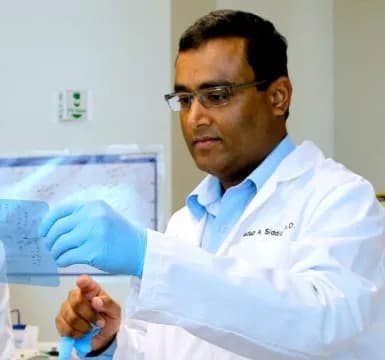
Damage To Tiny Liver Protein Function Leads To Heart Disease, Fatty Liver
A UCF College of Medicine researcher has identified for the first time a tiny liver protein that when disrupted can lead to the nation's top killer -- cardiovascular disease -- as well as fatty liver disease, a precursor to cancer.
The chief culprit in disabling the protein's delicate mechanics is a fatty acid found in red meat and butter.
Dr. Shadab Siddiqi's discovery is the cover story of the June 10 edition ofThe Journal of Biological Chemistry. An associate professor in the medical school's Burnett School of Biomedical Sciences, Siddiqi's work focuses on how to prevent heart disease by regulating the secretion of very low density lipoproteins (VLDL) by the liver. These lipoproteins are known to increase cholesterol levels, a risk factor for plaque buildup in the arteries. His previous research has discovered how newly formed VLDLs are transported into the blood stream, forming plaque.
For healthy liver function, normal VLDL secretion must be kept in a delicate balance. Too little VLDL secretion causes fatty liver and, potentially, liver cancer. Identifying the protein and what activates it is the first step in finding ways to prevent its malfunction and disease.
Since changing diets is so difficult, Siddiqi hopes to find an easier alternative.
In a study funded by the National Institutes of Health, Siddiqi discovered a tiny protein -- called a Small Valosin-Containing Protein
Interacting Protein (SVIP) -- that regulates how much VLDL is secreted into the blood. SVIP in the liver must be regulated properly to ensure optimum health, Siddiqi said.
He equates the operation of the tiny protein to a manually operated car. To run smoothly, the driver must synchronize the gas pedal and the clutch. If the two aren't synchronized, the car doesn't move easily; it has fits and starts and ultimately stalls.
After identifying the SVIP protein, Siddiqi's lab found that it contains a binding site for myristic acid, a saturated, 14-carbon fatty acid that occurs in butterfat and animal fats, especially red meat. Based on that finding, UCF researchers studied the effects of different dietary fats, including myristic acid, on the functioning of SVIP. They found that only myristic acid activated SVIP to secrete excess very low-density proteins into the blood. But if myristic acid was absent, they found the liver failed to secrete any VLDL. That caused fats to build up in the liver, which can lead to cancer.
The findings suggest that high levels of myristic acid in the diet -- through animal and dairy fats -- keep SVIP from properly regulating the liver's secretion of VLDL.
"These findings suggest that our diet modulates the complex molecular processes that have profound effects on our health and lifespan," Siddiqi explained. "The challenge will be in creating a therapy that does not impact the liver's many other functions."
The above post is reprinted from materials provided by University of Central Florida. Note: Materials may be edited for content and length.
Disclaimer: DoveMed is not responsible for the adapted accuracy of news releases posted to DoveMed by contributing universities and institutions.
Primary Resource:
Tiwari, S., Siddiqi, S., Zhelyabovska, O., & Siddiqi, S. A. (2016). Silencing of Small Valosin-containing Protein-interacting Protein (SVIP) Reduces Very Low Density Lipoprotein (VLDL) Secretion from Rat Hepatocytes by Disrupting Its Endoplasmic Reticulum (ER)-to-Golgi Trafficking. Journal of Biological Chemistry, 291(24), 12514-12526.
Related Articles
Test Your Knowledge
Asked by users
Related Centers
Related Specialties
Related Physicians
Related Procedures
Related Resources
Join DoveHubs
and connect with fellow professionals

0 Comments
Please log in to post a comment.